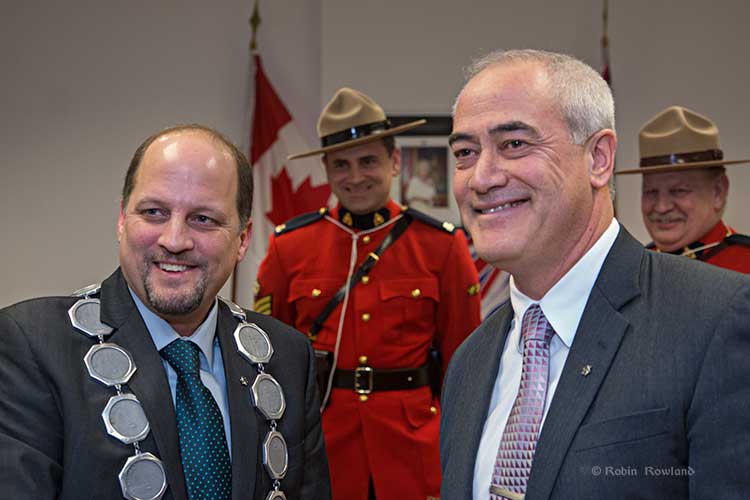
The District of Kitimat’s new council was sworn in a special ceremony at the Council Chambers at Northwest Community College, Monday, Dec. 1, 2014.
View the complete photo gallery.
Energy, environment and science in northwest British Columbia

The District of Kitimat’s new council was sworn in a special ceremony at the Council Chambers at Northwest Community College, Monday, Dec. 1, 2014.
View the complete photo gallery.

Enbridge Northern Gateway officials are loath (to put it mildly) to speak to the media but sometimes they let things slip. Earlier this summer, at a social event, I heard an Enbridge official (probably inadvertently) reveal that when the company’s engineers came before District of Kitimat Council earlier this year they were surprised and somewhat unprepared to fully answer the detailed technical questions from Councillor Phil Germuth on pipeline leak detection.
In January, 2015, Phil Germuth will take the centre chair as mayor at the Kitimat Council Chambers.
The results of the municipal election in Kitimat, and elsewhere across BC show one clear message; voters do want industrial development in their communities, but not at any price. Communities are no longer prepared to be drive by casualties for giant corporations on their road to shareholder value.
The federal Conservatives and the BC provincial Liberals have, up until now, successfully used the “all or nothing thinking” argument. That argument is: You either accept everything a project proponent wants, whether in the mining or energy sectors, or you are against all development. Psychologists will tell you that “all or nothing thinking” only leads to personal defeat and depression. In politics, especially in an age of attack ads and polarization, the all or nothing thinking strategy often works. Saturday’s results, however, show that at least at the municipal level, the all or nothing argument is a political loser. Where “all politics is local” the majority of people are aware of the details of the issues and reject black and white thinking.
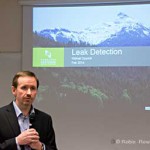
The Enbridge official went on to say that for their company observers, Germuth’s questions were a “what the…..” moment. As in “what the …..” is this small town councillor doing challenging our expertise?
But then Enbridge (and the other pipeline companies) have always tended to under estimate the intelligence of people who live along the route of proposed projects whether in British Columbia or elsewhere in North America, preferring to either ignore or demonize opponents and to lump skeptics into the opponent camp. The Northern Gateway Joint Review Panel also lost credibility when it accepted most of Northern Gateway’s arguments at face value while saying “what the ……” do these amateurs living along the pipeline route know?
Pro Development
“I am pro-development,” Germuth proclaimed to reporters in Kitimat on Saturday night after his landslide victory in his campaign for mayor.
On the issue of leak detection, over a period of two years, Germuth did his homework, checked his facts and looked for the best technology on leak detection for pipelines. That’s a crucial issue here where pipelines cross hundreds of kilometres of wilderness and there just aren’t the people around to notice something is amiss (as the people of Marshall, Michigan wondered at the time of the Line 6B breach back in 2010). Enbridge should have been prepared; Germuth first raised public questions about leak detection at a public forum in August 2012. In February 2014, after another eighteen months of research, he was ready to cross-examine, as much as possible under council rules of procedure. Enbridge fumbled the answers.
So that’s the kind of politician that will be mayor of Kitimat for the next four years, technically astute, pro-development but skeptical of corporate promises and determined to protect the environment.
Across the province, despite obstacles to opposition set up by the federal and provincial governments, proponents are now in for a tougher time (something that some companies will actually welcome since it raises the standards for development).
We see similar results in key votes in British Columbia. In Vancouver, Gregor Roberston, despite some problems with policies in some neighborhoods, won re-election on his green and anti-tankers platform. In Burnaby, Derek Corrigan handily won re-election and has already repeated his determination to stop the twinning of the Kinder Morgan pipeline through his town. In Prince Rupert, Lee Brain defeated incumbent Jack Musselman. Brain, who has on the ground experience working at an oil refinery in India, supports LNG development but has also been vocal in his opposition to Northern Gateway.
The new mayor in Terrace Carol Leclerc is an unknown factor, a former candidate for the BC Liberal party, who campaigned mainly on local issues. In the Terrace debate she refused to be pinned down on whether or not she supported Northern Gateway, saying, “Do I see Enbridge going ahead? Not a hope,” but later adding, “I’d go with a pipeline before I’d go with a rail car.”

Plebiscite confirmed
Kitimat’s mayor and council elections also confirm that Northern Gateway plebiscite vote last April. Kitimat wants industrial development but not at the price of the community and the environment. The unofficial pro-development slate lost. A last minute attempt to smear Germuth on social media was quickly shot down by people from all sides of the Kitimat debate. Smears don’t usually work in small towns where everyone knows everyone.
Larry Walker, an environmentalist with a track record in municipal politics as an alderman in Spruce Grove, Alberta, won a seat. Together with Rob Goffinet and Germuth, that is three solid votes for the environment. The other new councillor is Claire Rattee who will be one to watch. Will the rookie be the swing vote as Corinne Scott was?
Mario Feldhoff who came to third to Goffinet in the overall vote (Edwin Empinado was second) is a solid councillor with a strong reputation for doing his homework and attention to detail and the unofficial leader of the side more inclined to support development. Feldhoff got votes from all sides in the community.
During the debates, Feldhoff repeated his position that he supports David Black’s Kitimat Clean refinery. But as an accountant, Feldhoff will have to realize that Black’s plan, which many commentators say was economically doubtful with oil at $110 a barrel, is impractical with oil at $78 a barrel for Brent Crude and expected to fall farther. Any idea of a refinery bringing jobs to Kitimat will have to be put on hold for now.
LNG projects are also dependent on the volatility and uncertainty in the marketplace. The companies involved keep postponing the all important Final Investment Decisions.
There are also Kitimat specific issues to deal with. What happens to the airshed, now and in the future? Access to the ocean remains a big issue. RTA’s gift of land on Minette Bay is a step in the right direction, but while estuary land is great for camping, canoeing and nature lovers, it is not a beach. There is still the need for a well-managed marina and boat launch that will be open and available to everyone in the valley.
Germuth will have to unite a sometimes contentious council to ensure Kitimat’s future prosperity without giving up the skepticism necessary when corporations sit on a table facing council on a Monday night, trying to sell their latest projects. That all means that Germuth has his job cut out for him over the next four years.
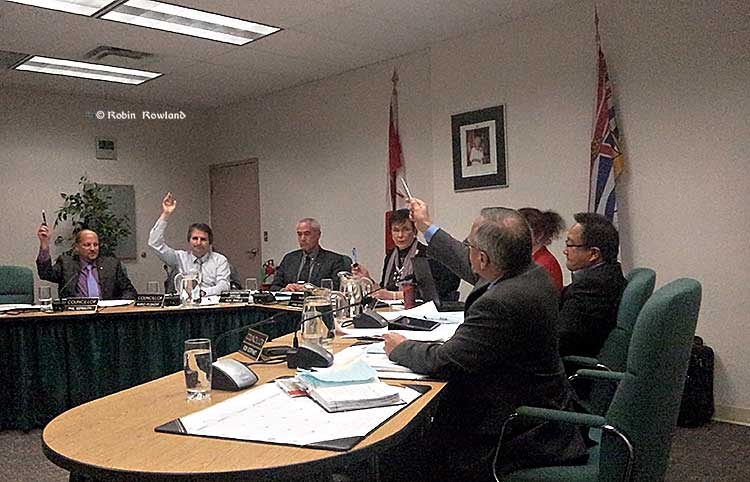
District of Kitimat Council voted four to one Monday night to officially oppose the Northern Gateway pipeline, terminal and tanker project.
After a lengthy debate, Mayor Joanne Monaghan, Councillors Phil Germuth, Mario Feldhoff and Rob Goffinet voted in favour of the motion. Councillor Edwin Empinado voted against the motion. Councillors Mary Murphy and Corrine Scott were absent due to illness.
Part of the debate was a search for unanimity and that meant simplifying the original motion from Phil Germuth, eliminating references to the Haisla Nation and “neighboring communities,” largely at the insistence of Mayor Monaghan.
Germuth’s original motion read:
That Mayor and Council support the results of the April 12th plebiscite, the Haisla and our neighboring communities by adopting a position of being opposed to the Enbridge Northern Gateway project.
What passed is:
That Mayor and Council support the results of the April 12th plebiscite by adopting a position of being opposed to the Enbridge Northern Gateway project.
Council was in a search for unanimity, so Germuth eventually agreed to a friendly amendment that eliminated the references to neighboring communities. Mayor Monaghan, in the debate, said that Germuth’s full motion was against the spirit of the plebiscite, which she argued was just for Kitimat.
In opening the debate, Germuth specifically told council that it was time for Kitimat to join and support both the Haisla Nation and neighboring communities Terrace, Prince Rupert and Smithers which had earlier voted to oppose the Northern Gateway project.
Germuth noted that Kitimat is an industrial town and does support industrial projects but for him and the people who voted against the project, Enbridge Northern Gateway is the wrong project.
Mario Feldhoff, who earlier in the year had said he supported Northern Gateway, told council that with the plebiscite result, it was time for council to support the will of the majority of Kitimat residents. Feldhoff went on to say that he had reservations about rejecting Gateway. He added that he hoped that newspaper magnate David Black’s plan for a refinery at Onion Flats outside Kitimat would bring thousands of jobs to the region.

Rob Goffinet pointed out residents of Kitimat, if anyone, were experts on the Northern Gateway, after five years of presentations before council from Enbridge Northern Gateway, from Douglas Channel Watch and others. He said that Kitimatians also had the opportunity to read the full report from the Joint Review Panel. Overall, Goffinet said he was in “favour of certain industrial development,” but Northern Gateway failed the test. He called on Prime Minister Stephen Harper to respect the decision by the people of Kitimat.
Edwin Empinado asked council to consider five questions, mainly about potential changes in the future for scientific and technical advances. Empinado also worried that saying no to Northern Gateway was beyond the powers of a municipality. He said he would vote against the motion because he preferred council to remain neutral.
Monaghan said she was having difficulty with Germuth’s motion because she felt that it went further than what Kitimat had voted for. She also said she supports the David Black refinery, believing that it would bring much need jobs to the region.
At the point it looked as the motion would pass three to two and council struggled to find a compromise. Feldhoff suggested an amendment dropping the references to the Haisla and neighbors. Goffinet pointed out that if the simplified motion passed, Kitimat would be joining the Haisla, Terrace, Prince Rupert and Smithers anyway. Germuth then agreed to make the amendment “friendly.”
Empinado maintained his position against the motion, saying that the motion would not allow the council to make changes in the future. Empinado stuck by his position that there must be scientific rigour applied to the Northern Gateway issue and his belief that the motion did not allow for future changes.
Feldhoff then said there was nothing in the motion that precluded council for re-examining the issue in the future.
Monaghan then called the motion and it passed with Empinado’s dissenting vote.
Both Feldhoff and Monaghan said that they had been approached by people who did not vote but who were in favour of Northern Gateway. Feldhoff said he hoped that would be a lesson for those who do not turn out at the polls.
Monaghan had opened the debate by asking that it be tabled until Councillors Scott and Murphy could be present. That motion was defeated 4 to 1.

Fisheries and Oceans has once again snubbed District of Kitimat Council, by refusing to appear in public before council to answer questions about key issues.
At the Monday, March 10 council meeting, the snub was on the issue of who is responsible for the Kitimat River, facing “increased usage of the riverbank during future construction periods” as well as concerns raised by council earlier over waste left by campers.
In the fall, DFO also refused to appear before council when the department was asked to do so on the issue of Clio Bay remediation.
A report to Council from the District’s Deputy Administrative Officer, Warren Waycheshen, noted that district administration “was recently advised that Fisheries and Oceans are unable to participate in Council meetings, however, they will continue to meet at an operational level to provide information on DFO’s regulatory role.
Waycheshen’s report noted” “District Staff will continue to correspond with Fisheries and Oceans on riverbank camping, and when another operational meeting can be coordinated, Council will be advised of the date and time.”
In other words, DFO officials will continue to meet with district staff and council, in private, but are not accountable to the Kitimat public for their actions, except through what district staff may report to council.
The rest of the report consisted of quotes form the amended Fisheries Act and what appears to be a printout of a DFO Power Point presentation on how it sees its current role.
So now that the federal government appears to have downloaded responsibility to the District, the riverbank ball is now in the hands of Kitimat Council, whether or not the Council actually has jurisdiction.
Councillor Phil Germuth presented a motion asking that District staff prepare a map showing who exactly owns the land along the Kitimat River and what that land is being used for.
In the debate, Councillor Corrine Scott noted, “The first paragraph says Fisheries and Oceans won’t attend a council meeting. Fine, we’ve got that part. But then that’s it. Everything else is about the fisheries protection program and policy statements and all the rest of it. But it doesn’t actually answer the question about any concerns regarding waste left by campers and whether its okay or whether we should be putting in more garbage cans or that sort of thing.
“That’s what I was looking for from a report. What should the setbacks be? Should there be any setbacks. Should there be any camping? Do we have to have a certain number of receptacles for garbage? I just don’t know. I was expecting more than what we got out of this report.”
Councillors Mary Murphy and Mario Feldhoff noted that the District has done reports on how the riverbank is used.
District Planner Daniel Martin told Council that DFO has said the department has “no real concerns’ about people camping on the river “unless they begin to destroy fish habitat.” DFO told Kitimat staff. “If the District has concern about access to the river, then control access to the river.”
“I know that we have a report, it was a very, very good report,” Scott then said. “That’s not what we’re talking about. I was waiting to hear what Fisheries and Oceans has to say, I know what we’ve got and what we’re doing and what is being monitored. I thought motion was to find out from Fisheries and Oceans if there was some kind of other issues we should know about.” Scott noted that if Martin’s statement had been included in the report, she would have been satisfied. “I was waiting to hear what the Department of Fisheries and Oceans had to say.”
Germuth then pointed out that he wanted to know who the landowners are so if Council descies to control access to the river because, “If we put a gate up on the river, we’re not just controlling access for campers, we’re controlling access for everyone else that wants to go through. I want to know who owns the land, so if we decide to do something, we can chat with landowners.
“We’re not going to get anywhere with DFO,” Feldhoff said. “They’ve been here in the past, and , as I recall, they said they don’t think there is a problem. We may think there’s a problem but they don’t think it’s high enough in terms of priorities. So we might want to reacquaint ourselves with what was going on. There are enough reports to choke a horse, going back at least ten years.”
“Longer that that, I do believe,” Mayor Joanne Monaghan interjected.
Councillor Edwin Empinado agreed with Scott saying, “The response from DFO didn’t really answer the motion [the original question from Council]. Fisheries just gives us the Fisheries Act, their policies, regulations, guidelines, program changes. It doesn’t talk about riverbanks.”
Germuth’s motion was carried unanimously.
‘

District Council failed the people of Kitimat Monday night by approving a confusing question for the plebiscite on the Northern Gateway project. (There are already comments on social media that some people find the question incomprehensible).
What’s more, the Council set a sorry precedent Monday and undermined their ability to have a constructive debate on any contentious issues in the future.
Here’s what went wrong.
With the new year, Council is operating under new rules of procedure that allow discussion of an issue to take place without a motion on the floor.
The idea was, apparently, to allow members of Council to rationally and collegially discuss an issue and perhaps come to a consensus before a motion is presented, debated and voted.
That’s not what happened Monday night.
There was a staff report before Council with suggestions for either a simple yes or no vote for the Northern Gateway plebiscite or a series of questions for the voters to decide.
Councillor Rob Goffinet asked Council to discuss the issue under the new procedure. There was no motion on the floor.
The first part of the debate was about a question many have been asking. What good will a plebiscite do if all the power is in the hands of the federal government? Councillors pointed out that there was promise to “survey” the people of Kitimat after the Joint Review Report and that it was also a good idea to find out what the people of Kitimat were thinking.
Then, after only a few minutes of discussion, Councillor Mario Feldhoff introduced his motion outlining his preferred version of the plebiscite question; therefore preempting any further general discussion and, in effect, hijacking the council session.
At that point, the actual discussion by Council of one of the most important questions in Kitimat history had been going on for less than fifteen minutes.
Noting that the Council has been operating under the new rules for just three weeks, Mayor Joanne Monaghan then had to set a precedent.
What Monaghan should have done was act as a neutral Speaker and rule Feldhoff’s motion premature and out of order. At very least, she should have asked Feldhoff to withdraw the motion to allow general discussion to continue and perhaps allow a consensus to emerge.
By permitting Feldhoff’s motion to go to the floor, Monaghan undermined the spirit of the new council procedures.
It is not just Monaghan who is to blame for this. Feldhoff is an experienced councillor and a good parliamentarian. He always prepares carefully and often presents his own motions. While those motions are not always successful, presenting those motions allow Feldhoff to pilot the agenda on an issue. The other members of Council who have worked with Feldhoff for years should have anticipated this manoeuvre and, when he presented his motion, raised a point of order, telling Monaghan the motion was a violation of the spirit of the new discussion procedures.
The other failure is that those council members who preferred a simple question, as far as the reporters could tell from the debate, failed to have their own motions ready, instead depending on the staff recommendations. Again, those council members should have anticipated Feldhoff’s manoeuvre and prepared with their own motions.
The ideal, of course, was for Council to spend the time to hash out the best question on Northern Gateway, even if the debate went into the wee hours of the morning. Instead the debate was on the wording and intent of the Feldhoff motion, which reflects his belief , stated last week, that the Joint Review Panel process was valid, something many residents of Kitimat disagree with, since they consider the JRP process to have been far from fair.
The ballot question, as moved by Councillor Mario Feldhoff is:
Do you support the final report recommendations of the Joint Review Panel of the Canadian Environmental Assessment Authority (sic) and the National Energy Board, that the Enbridge Northern Gateway project be approved subject to 209 conditions set out in Volume 2 of the JRP’s final report?
Eligible residents will have the choice of voting yes, no or undecided.
There are too many questions wound up in the Feldhoff motion. There are those who support Northern Gateway and those who oppose it. There are those on both sides who have strong reservations about the Joint Review Process. There’s the big question of whether or not the Harper government will actually bother to rigorously enforce the 209 conditions. (The test for that will be in the upcoming federal budget, and whether or not there is increased funding for the agencies responsible for the conditions. Since Finance Minister Jim Flaherty is determined to balance the budget prior to the 2015 election, that is highly unlikely)
Council must revisit the plebiscite question at next Monday’s meeting and come up with a consensus on a proper question, even if it means the debate continues until the sun comes up Tuesday morning (and remember this is January).
Council must also set proper procedures so that a wide ranging discussion, as envisioned in the new procedures, aren’t unnecessarily and abruptly halted by a premature motion.
What about the JRP?
In his statement to Council on January 6, and in his motion on the plebiscite question, Councillor Mario Feldhoff is wrongly giving the Canadian Environmental Assessment Agency prime of place in the Northern Gateway Joint Review Panel. He points out, correctly that the CEAA has rejected the Prosperity Mine twice and uses that to validate the finding of the Joint Review Panel.
However, there is no evidence that three members of the panel have anything to do with the Environmental Assessment Agency. The biographies say that Sheila Leggett “ has been a member of the National Energy Board since 2006 and is currently the vice-chair of the National Energy Board.” Kenneth Bateman, according to the biography, has also been a member of the National Energy Board since 2006. As for the third member, Hans Matthews, he is a mining executive who works with First Nations on resource issues. None of the biographies of the three mention any connection with the Environmental Assessment Agency.
There is one note at the bottom of the bio page that says: “The Panel is supported by a group of staff called a Secretariat. The Secretariat is made up of both National Energy Board and Canadian Environmental Assessment Agency staff.”
So while the Joint Review Panel had support from the CEAA staff, the decision was made by two NEB members and a mining executive.
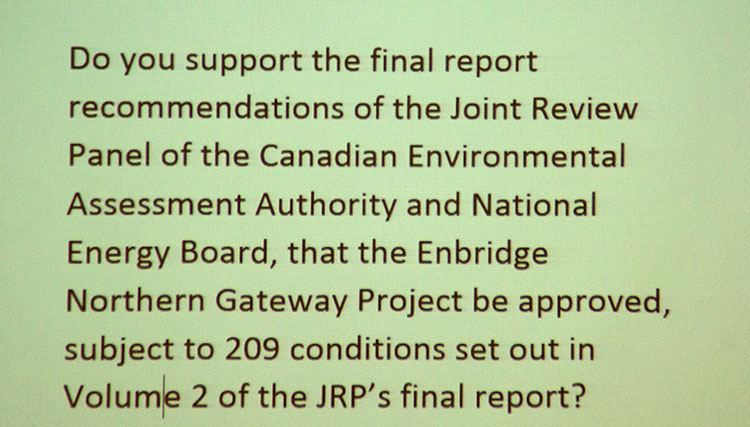
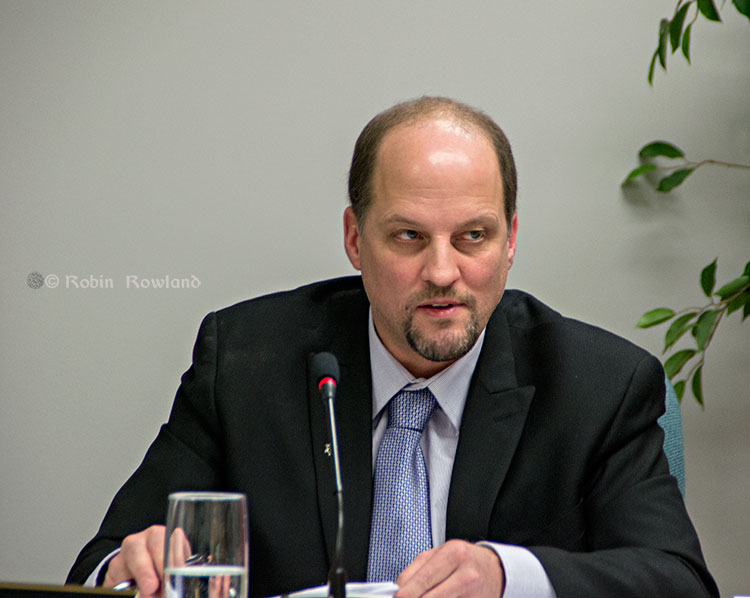
District of Kitimat Council voted Monday night to hold a plebiscite on whether or not the community supports the controversial Enbridge Northern Gateway project.
District council and staff will decide the actual question for voters and the date for the plebiscite in the coming couple of weeks.
A staff report described a plebiscite as “a non-binding form of referendum,” as defined by the BC Local Government Act.
The council decision comes after the Northern Gateway Joint Review Panel released its decision on December 16, that approved the pipeline and tanker project along with 209 conditions.
After the release of the Joint Review decision, the District of Kitimat issued a news release saying, “Kitimat Council has taken a neutral stance with respect to Northern Gateway. Council will take the necessary time to review the report in order to understand the content and reasons for the decision.”
On January 16, 2012 the council adopted a resolution “that after the completion of the JRP process, the District of Kitimat survey the residents of Kitimat regarding their opinion on the Enbridge Northern Gateway project.” After the JRP decision, the District reaffrimed that it would “undertake a survey of Kitimat residents to determine their opinions of the project now that the JRP has concluded its process.”
District staff had recommended hiring an independent polling firm to conduct the survey, pointing to a pollster’s ability to craft the appropriate questions and provide quick results.
Council quickly shot down the idea. A motion by Councillor Mario Feldhoff to use a polling firm did not get a seconder.
Councillor Rob Goffinet, who made the motion for the plebiscite, noted that even as a politician he doesn’t answer phone calls from unknown numbers. He said, “People do not want a pollster to phone them and do a check list how do you feel on a project. How can we be assured if someone in or out of their home will answer a call from a pollster? I would give total responsibility to every adult citizen of Kitimat who has a point of view to express it in a yes or no ballot.”
Councillor Phil Germuth added, “Those are the same companies that went out prior to the last provincial election and said one party was going to wipe it out and we know what happened there.” Germuth was referring to BC Premier Christy Clark’s come from behind majority victory which was not predicted in the polls.
Germuth told the meeting he believed an unbiased question could be posed in the form of a referendum on the Northern Gateway project. “I have full confidence in our staff that they will be able, along with some assistance from council, to develop questions that are not going to appear biased. It should be very simple, yes means yes, no means no.”
Councillor Mario Feldhoff, who earlier in the evening had, for the first time, declared that he is in favour of the Northern Gateway project, told council that he preferred using a polling firm because it could come back with a “statistically significant” result.
Council voted six to one in favour of the plebiscite. The lone dissenter was Councillor Edwin Empinado who told his colleagues that a mail-in ballot, another of the options presented by staff, would be more inclusive. Empinado said he was concerned that a plebiscite would mean a low voter turnout.
Warren Waycheshen, the district’s deputy chief administrative officer, told council that the plebiscite would have to be held under the provisions of BC’s Local Government Act which covers elections and referenda, but with the plebiscite the council would have more flexibility in deciding how the vote would take place. The act would still cover such things as who was eligible to vote and the use of campaign signs.
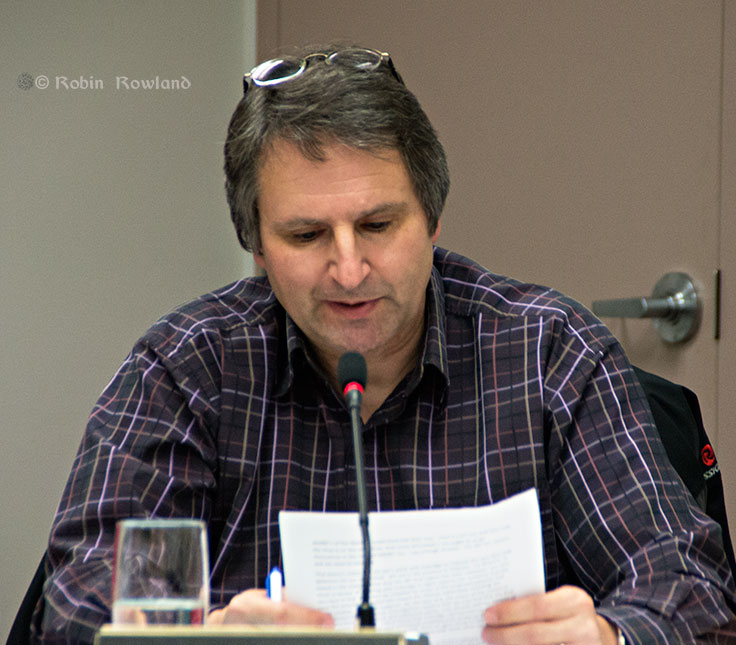
The neutrality that council had maintained for at least the previous three years began to break down during Monday’s meeting meeting when Germuth proposed a motion that would have required Enbridge to install within Kitimat’s jurisdiction a detection system capable of locating small volumes of leakage from the pipeline, a measure that is likely beyond the recommendations of the JRP decision.
It was then that Feldhoff became the first Kitimat councillor to actually declare for or against the Northern Gateway, telling council, saying he agreed with the JRP, “The overall risk was manageable and the project was in Canada’s interest. On the whole I am in favour of the conditions and recommendations of the JRP… Not only am I a District of Kitimat Councillor, I am a Canadian. To my mind, opposition to the JRP Northern Gateway report at this stage is yet another case of NIMBY-ism, not in my backyard.”
In the end, at Feldhoff’s urging, the council modified the original motion, so that it called on the District to meet with Enbridge to discuss an enhanced pipeline leak detection system where a leak could “impact the Kitimat watershed.”
It’s not clear what Council will do with the result of the plebiscite, since it is “non-binding.”
In the past two years, Terrace, Prince Rupert and Smithers councils, together with Kitimat Stikine Regional District and the Skeena Queen Charlotte Regional District, all voted to oppose Northern Gateway. Those were all council votes, taken without surveying local opinion.
Most of the decisions are in the hands of the federal government which has 180 days from the release of the JRP report to approve the project.
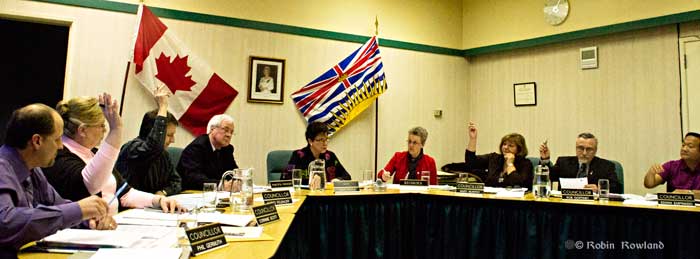
District of Kitimat council voted on Monday, April 2, to ask the Northern Gateway Joint Review Panel to ensure that the town’s water supply is protected if the controversial pipeline is built. A second motion called on Enbridge to give the district a detailed and public presentation on its provisions to protect the water supply in the case of a pipeline breach along the Kitimat River.
That second motion was passed after a motion from Councillor Phil Germuth holding Enbridge responsible for any disruption to the water supply was defeated by a vote of 4-3. However, council’s new motion did not preclude Germuth asking Enbridge his original questions about liability.
Germuth had presented council with the two original motions, after a presentation in March
by Douglas Channel Watch about the dangers avalanches could present to the Enbridge twin pipelines along the Kitimat River watershed.
The first motion called on the District of Kitimat to present a written position to the Joint Review Panel based on the district’s status as a government participant emphasizing the potential dangers to the water supply and noting that the mayor and council are “legally responsible to make every effort to ensure the city of Kitimat’s water supply is uninterrupted and of the highest quality.”
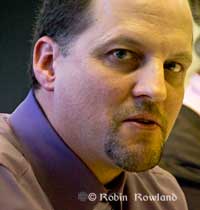
After introducing the motion, Germuth said he believed the motion went along with council’s position to remain neutral because nothing in the motion took a position for or against the project.
Councillor Mario Feldhoff said he supported the motion without supporting all the details of Germuth’s full statement, a indication of the more intense debate to come over the second motion.
Mary Murphy also supported the motion, pointing to the potential problems of “transporting hydrocarbons” by both tanker and pipeline.
Mayor Joanne Monaghan said she had a problem with the motion because had earlier passed a motion saying it would wait to take a position until after the Joint Review Panel had reported.
Councillor Corinne Scott said she would speak for the motion, agreeing that this was a request for information and not saying council was for or against the project, adding “we are all concerned about the potential of what could happen to our water supply.”
Read Councillor Phil Germuth’s motions (pdf)
Feldhoff agreed that a letter to the JRP was not taking a position, adding, that on receipt of a letter the Joint Review Panel should take a very serious look at the issue of the water supply of Kitimat. Monaghan agreed but said if the council was to write the letter that it be accurate.
Feldhoff then proposed a friendly amendment calling on District staff to write a draft letter to the Joint Review Panel that council could then examine and agree to.
With the amendment, the motion passed unanimously.
Germuth’s second motion was more contentious, calling on Enbridge to provide detailed plans for ensuring the quality of water for the District of Kitimat and accepting “full liability” for the restoration of the Kitimat’s “entire water system” in case of a pipeline breach. Although some councilors had reservations about Germuth’s list of items, they agreed that Enbridge be called to meet council “face to face,” as Monaghan put it, by responding in person rather than by letter.
Enbridge had already responded to the motion from the previous meeting, calling on it to respond to the concerns raised by Douglas Channel Watch about the possibility of avalanche danger in the Nimbus Mountain area.
In an e-mail to council, Michele Perrett of Enbridge maintained that most of the issue had been addressed by Enbridge in either its original filing with the Joint Review Panel or by subsequent responses to information requests to the JRP, adding
Specifically we have filed geotechnical studies and responded to information requests that include information on avalanches, rock fall, glaciomarine clay slides, debris flows and avulsion in the Kitimat area and have reviewed information filed on this subject by intervenors.
The e-mail said that Drum Cavers, a geotechnical specialist would be making a presentation to council on Monday, April 16.
Enbridge e-mail to District of Kitimat Council (pdf)
Monaghan noted that Douglas Channel Watch and other groups are limited by council policy to 10 minutes and that Murray Minchin had told council that to be fair, Enbridge’s response should also be limited to 10 minutes. Council agreed that the 10 minute limit is needed to make sure that council meetings finish on time and there was some discussion of allowing Enbridge to make a more lengthy presentation outside of a regular council meeting. That would allow Enbridge to not only respond to the earlier concerns about the Nimbus Mountain avalanche danger but also to the concerns about the town’s water supply.
Some members of council, led by Feldhoff, also expressed reservations about the seven points raised by Germuth; others wanted to possibly add their own concerns to any questions for Enbridge. Feldhoff was not prepared to vote for the original motion without more information.
Feldhoff then asked that the district administration prepare a report on the water supply, saying “I think the concerns may be somewhat overstated at the moment.” Councillor Rob Goffinet also called for a report from district staff on the “ramifications for our water supply,” adding that council should not “engage with Enbridge” until that report was ready.
Germuth’s motion, with all of the original questions, along with the invitation for Enbridge to make a public presentation, was then defeated by a vote of 4-3.
Councillor Scott then moved as part of the presentation that Enbridge was earlier invited to present that water issues be added to the list and that council draft a list of questions for the company, that could include Germuth’s original questions.
Germuth asked if the council could put a time limit on Enbridge’s response because the federal budget calls for limiting to the Joint Review Panel. Feldhoff responded that the new motion concerned council’s concerns just with Enbridge and that council should be respectful of Enbridge and hopefully the company could integrate those questions as well.
Goffinet said he wanted Enbridge to know all of the district’s concerns and so, in effect, this motion would get what Councillor Germuth wanted but by a different route, adding that if Cavers, Enbridge’s geotechnical expert, was unable to answer the question, Enbridge would be asked to return and answer the questions at a later date at a public meeting.
That motion passed unanimously.
Update:
Mary Murphy clarified her remarks in an e-mail by saying
I stated I had concerns with all hydro carbons transported along the river coastline…like CN Rail and transporting hydro carbons and the likelihood of a derailment etc, andhow that would also effect our waters. CN Rail is and has been transporting hydro carbons, etc for some time, and have had severe derailments.
District of Kitimat Council voted unanimously Monday, March 19, 2012, to invite Enbridge to make a presentation to council about the concerns about avalanches along the Northern Gateway pipeline route that could threaten the town’s drinking water.
Two weeks earlier Murray Minchin of Douglas Channel Watch gave a detailed presentation that he said showed evidence of major avalanches in the past on the bitumen and condensate pipelines route. Minchin said at the time a major avalanche could breach the diluted bitumen pipeline and quickly threaten Kitimat’s drinking water.
At the time, Minchin asked that council sponsor a new public forum that would include representatives from Enbridge, the Haisla First Nation and an environmental group.
However, Monday’s motion from Councillor Mario Feldhoff read:
That we invite Enbridge to make a presentation to Council addressing issues raised by Douglas Channel Watch in Mr Minchin’s March 5, 2012, presentation to Council entitled Nimbus Mountain area.
The motion was quickly carried with almost no discussion.

The water supply problem is worrying some members of council. Councillor Phil Germuth said that in the future he will be introducing a motion that will call attention to worries that, in case of a pipeline breach, that Kitimat would not have a water supply for months or even years.
At the opening of the meeting, Veronica Bilash, of Douglas Channel Watch, gave a presentation, based on information from West Coast Environmental Law on the responsibilities of municipalities when it comes to the proposed pipeline and presentations to the Northern Gateway Joint Review process.
Bilash criticized council for not participating in the Joint Review panel.
Administrator Ron Poole said Kitimat is an intervenor in the process, but, so far, Kitimat has not formally taken part in the Joint Review. Kitimat is actually listed as a “government participant.” The district has not filed any documents with the JRP.
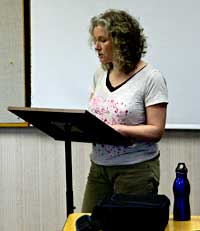
The council has voted to remain neutral and not take any position until the JRP has issued its report. Bilash said that this position is preventing Kitimat from making any views based on municipal responsibilities until it is too late.
In the presentation, written by West Coast Environmental Law staff lawyer, Josh Patterson, points out that municipal governments have responsibility for
Bilash said that Kitimat would face major impacts in these areas and that by remaining neutral, council was not facing its responsibilities.